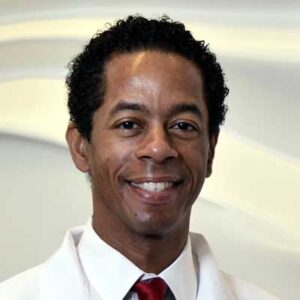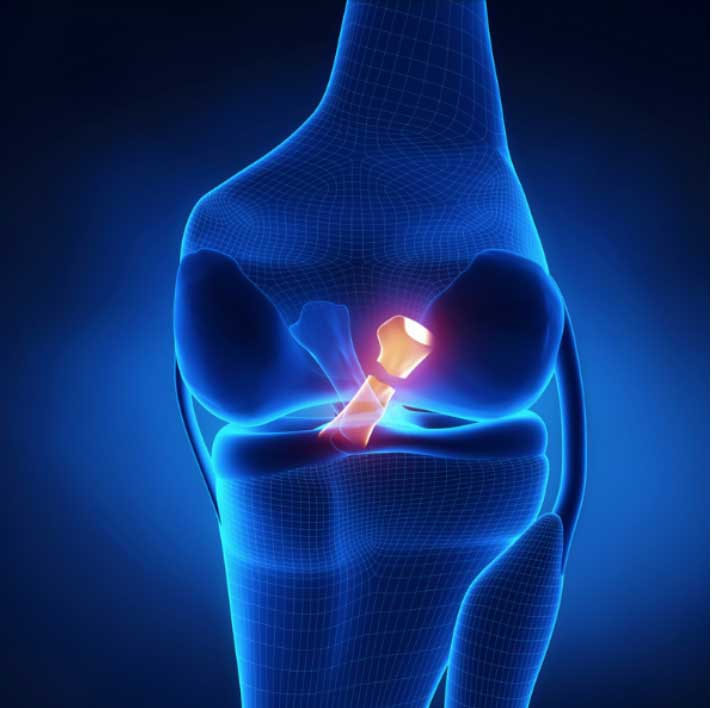ACL Knee Injury Specialist

Are you an athlete who participates in sports that involve jumping or quick stopping? If so, you may be at risk of injuring your anterior cruciate ligament, or ACL. An ACL injury is one of the most common injuries suffered by athletes. ACL injury specialist, Doctor Riley J. Williams provides diagnosis as well as surgical and nonsurgical treatment options for patients in Manhattan, Brooklyn, New York City and surrounding areas who have sustained an ACL injury. Contact Dr. Williams’ team today!
What is an ACL injury or ACL tear?
The anterior cruciate ligament, or ACL, is one of the four main ligaments of the knee. The ACL is responsible for keeping the tibia (shin bone) from sliding out in front of the femur (thigh bone). The anterior cruciate ligament runs through the knee from the front of the tibia to the back of the femur and is important in maintaining stability in the knee joint during regular and athletic activities. An injury to the ACL occurs when the ligament is stretched beyond its normal range, and the shin bone slips out from under the thigh bone. Dr. Riley J. Williams, an orthopedic knee specialist serving Manhattan and New York City has extensive experience in treating ACL tears and other ligament injuries in the knee.
How does an ACL tear or injury happen?
An anterior cruciate ligament injury is one of the most common sports-related injuries. The severity can range from a mild strain to a complete tear. Typically, an ACL tear occurs from a direct blow to the knee during contact sports or during an unnatural twisting and pivoting motion that occurs during daily life or sporting activities. Awkward landings from a jump or sudden stopping in sports like basketball, soccer, lacrosse, tennis and skiing can also cause ACL injuries.
What are the symptoms of an ACL injury or ACL tear?
After an anterior cruciate ligament injury, almost all patients experience knee pain, sudden swelling and limited range of motion. In some cases, patients may hear a popping sound at the time of injury. Joint instability is often reported with a feeling that the knee might collapse under the patient’s own weight. Patients oftentimes report that the knee “gives way”. Some patients have difficulty walking or standing without pain.
How is an ACL injury or ACL tear diagnosed?
Dr. Riley Williams, orthopedic surgeon and knee doctor, will conduct a thorough physical examination of the joint and inquire about the events leading up to the injury. He will assess the range of motion, look for swelling and assess the degree of pain. A series of imaging studies will typically be used to aid in diagnosis. X-rays may be used to determine if there is any bone damage. An MRI, (magnetic resonance imaging) is typically used to evaluate the condition of the soft tissues including ligaments, tendons and cartilage. An MRI can help determine if a ligament is frayed, strained or completely torn.
What is the treatment for an ACL injury or tear?
The ultimate goal of treatment is to both reduce pain and swelling and for the patient to regain stability and function of the injured joint. Not all ACL injuries require surgery. A strain or sprain may heal on its own with proper rest and rehabilitation. The severity of symptoms, and the condition of the ACL will determine if surgery needs to occur.
Non-surgical treatment of an ACL injury:
If the anterior cruciate ligament injury does not cause instability in the knee joint, is mildly sprained, and does not include a complete tear of the ACL. Dr. Williams may prescribe non-surgical treatment. The RICE method (rest, ice, compression, elevation) can be helpful in eliminating pain and swelling. A regimen of modified activity may be recommended, as well as joint support (bracing), and physical therapy may be enough to heal the joint.
Surgical treatment of an ACL injury:
In most cases, an ACL tear will not heal on its own because there is poor blood supply to the ligament. The goals of surgery are to restore knee stability and normal knee function, Dr. Williams employs an arthroscopic assisted method to reconstruct the ACL with a new ligament graft; the fragment of the original ACL are removed during this procedure. There are many types of grafts available to patients. Dr. Williams will discuss all of these options, as well as the pros and cons of each type of graft. Grafts used for ACL reconstruction include those taken from the patient’s own tissues (autografts) and those obtained from a donor source (allografts). Dr. Williams tailors his recommendation for ACL surgery based on the patient’s desired level of activity and sport following their full recovery
For more information on an ACL injury or tear, or on an anterior cruciate ligament reconstruction and the treatment options available, please contact the office of Riley Williams, MD, knee doctor serving Manhattan and New York City.
Locations
610 W 58th Street
New York, NY 10019
148 39th Street, 7th Floor
Brooklyn, NY 11232




